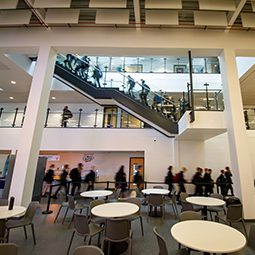Assessment
At Brian Clarke we see assessment as integral to teaching and learning and inextricably linked to curriculum design. Carefully constructed assessment enables the classroom teacher to diagnose what students know and understand during lessons/over time and critically provides support through feedback to move the learning on.
Assessment and meaningful feedback are also crucial to students who need to be able to master key content and make progress through their various curriculum journeys.
Baselining on Entry
On entry we use the Key Stage 2 published data, supplemented by:
- GL Assessments in Maths and Science
- NGRT Assessments
- EAL proficiency levels as appropriate
Assessment Approaches
We use three broad overarching forms of assessment: day-to-day in school formative assessment, in-school summative assessment and nationally standardised summative assessment.
In-school formative assessment
Formative assessment takes many forms. It includes directed question and answer sessions that take place verbally in classrooms. Written responses and work in books, knowledge recall quizzes in lesson time asking students to retrieve prior knowledge.
The purpose of formative assessment is to enable:
- Teachers to identify how students are performing on a continuing basis. To identify gaps and misconceptions and to use this information to provide appropriate real time support or extension, evaluate teaching and inform future lessons.
- Students to measure their knowledge and understanding against learning objectives and identify areas in which they need to improve.
In-school summative assessment
Summative assessment includes end of unit(s) work or topic(s) tests and end of year exams. Assessments ask students to recall and apply knowledge and skills learnt from previous units and years of study where appropriate.
The structure and style of summative assessments varies depending on the subject taught and year students are in. This reflects the different demands of subject content and the learning journey that students are on in different subject areas. Summative assessments are centrally set and standardised in departments.
The purpose of summative assessments are to enable:
- Teachers to identify how individual students/ cohorts of students are performing on a continuing basis. To identify gaps and misconceptions and to use this information to provide appropriate support or extension, evaluate teaching and inform future lessons and curriculum design.
- Students to understand how well they have learned and understood a topic(s) or course of work over a period of time. Through appropriate feedback students will know and understand what they need to do to improve.
- Parents to be informed about their child’s progress through the curriculum.
- Senior leaders to monitor the performance of student cohorts, identify where interventions may be required and to work with subject leads and teachers to ensure students are supported to achieve excellent progress.
Nationally standardised summative assessment
Nationally standardised summative assessments take the form of GCSEs and vocational qualifications at the end of Key Stage 4.
Nationally standardised summative assessment enables:
- Students and parents to understand how students are performing in comparison to students nationally
- Teachers to understand national expectations and assess their own performance in the broader national context
- School leaders to monitor the performance of student cohorts, identify where interventions may be required, and work with teachers to ensure students are supported to achieve excellent progress and attainment
Target Setting and Reporting to Parents
At Key Stage 3 (Years 7-9) parents will receive three reports per year:
- In the Autumn term this will be Attitude to Learning descriptors only.
- In the Spring and Summer terms this will be Attitude to Learning alongside a measure of how the student is progressing through the subject curriculum. These reports will inform parents of what ttheir child knows, understands and can do in relation to the curriculum covered.
At Key Stage 4 (Years 10-11) parents will receive three reports per year:
- For Year 10 this will be Attitude to Learning and a current working grade in the Autumn, Spring and Summer terms. Alongside the current grade there will be an indication of whether the student is on track to achieve their target grade.
- For Year 11 this will be Attitude to learing and a current working grade in the Autumn term and at the end of the Spring term before Easter. Early in the Spring term, students will receive a report with school standards and their mock examination results. In all three reports, there will be an indication of whether the student is on track to achieve their student target grade.
Key Stage 4 target grades are aspirational for all our students so that they make outstanding progress, both individually and collectively. We use a combination of Key Stage 2 test results and assessment data from Key Stage 3 to set targets that are challenging and meaningful. Students will receive subject specific target grades to reflect their strengths in particular subjects and to ensure that all students are challenged to reach their full potential.
Progress will also be reported at the annual parents evening for each year group.
Achievement for All (inclusion)
We have the same high expectations and aspirations for all students at Brian Clarke.
The principles of this assessment approach applies to all students, including those with special educational needs or disabilities.
Assessment is used diagnostically to contribute to the early identification of SEN and any requirements for support and intervention for all students including those who struggle with literacy. We use meaningful ways of measuring and reporting on all aspects of progress including communication, social skills physical development, resilience, and independence. For students working below the national expected level of attainment, our assessment arrangements will consider progress relative to student starting points and take this into account alongside the nature of the student’s learning difficulties.
Tracking System and Student Level Data Handling
Within the Cranmer Education Trust tracking data from each cycle is monitored by subject/faculty leaders, senior leaders responsible for the quality of learning, standards and achievement and by the strategic group of academies headteachers, with the CEO and data analyst, to ensure that good practice can be shared, and underperformance addressed quickly. This includes monitoring of progress of key groups. Student data is always current; both current data and predictions in Years 11, 6 and 13 against targets, are reported to the Local Governing Committee and the Standards Committee of the Trust Board, in late Spring.
Moderation of GCSE assessment will take place in conjunction with Blue Coat School and other secondaries on the processing of joining the trust and will be externally checked by Specialist Leaders of Education (SLEs) to ensure accuracy.
Target Setting
Targets are set for students using prior attainment data from Key Stage 2, plus DfE value-added models, to set an absolute minimum expectation for progress by the end of Year 11. Challenge is added by using Fischer Family Trust (FFT) Top 25% including student targets in each subject are based on national Key Stage 2 – Key Stage 4 transition matrices, again targeting the top 25% for progress.
No gaps in expectation will be built in on the grounds of gender, disadvantage, ethnicity, prior attainment banding or SEN. Targets for disadvantaged students are equally as challenging as those for non-disadvantaged, so the size of the disadvantaged cohort is never a limiting factor on the aspirations of the school. Additional challenge is added to targets for the EAL cohort using the FFT analysis of contextual factors to reflect the acceleration that EAL learners typically make at national level (though not always at local level) throughout Key Stage 4.
Students are on a 5-year learning journey which will culminate in public examinations. This is divided into 2 distinct phases – Years 7-9 which is broad, deep and rich, and which lays the foundations of subject mastery, and Years 10-11 which remains broad through EBacc, and also offers opportunities for greater depth, some specialization and some branching out into new disciplines and courses linked to potential employment routes.
The Brian Clarke Church of England Academy is proud to be part of the Cranmer Education Trust
Cranmer Education Trust is a company limited by guarantee and an exempt charity registered in England. Company registration number: 07687709. Registered Office: Cranmer Education Trust, c/o The Blue Coat School, Egerton Street, Oldham OL1 3SQ. The website address is www.cranmereducationtrust.com and the phone number 0161 785 5082.




